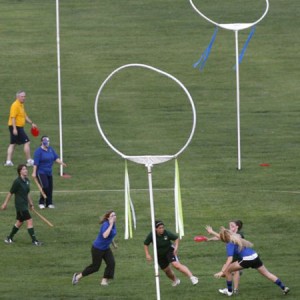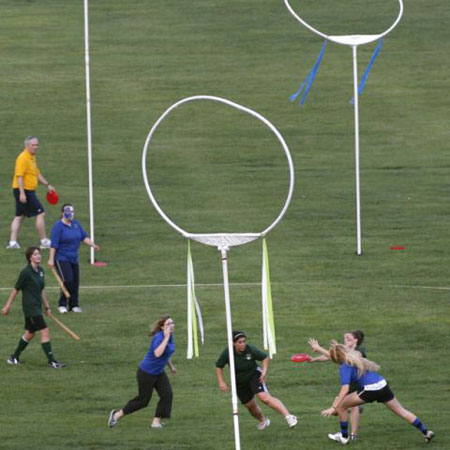Quidditch had its world cup earlier this week in Randall’s Island, NY. This most famous sport in the wizarding world puts two teams of seven wizards on brooms at odds.

The teams are divided into three chasers, two beaters, one seeker, and one keeper. The chasers chase the quaffle, a red ball, and attempt to score into one of the other team’s goals. The keeper, who act as a goaltender would in soccer, tries to block shots of the quaffle from entering the goals. A second ball, the bludger, chases players on their broomsticks trying to knock them off.
The beaters are armed with bats in order to hit bludgers away from their teammates. The seeker handles the third, final, and most important ball, the golden snitch. The seeker has to compete against the other team’s seeker in order to capture the snitch. Once the snitch is caught, the team that caught it wins 150 extra points and the game is over.
In the muggle world, rules are different. Quidditch is handled by the International Quidditch Association (IQA). According to the IQA’s rule book, the chasers take a volleyball quaffle and run down the field with it, attempting score it into the other team’s goals, which are defended by the keeper. The beaters use dodge ball bludgers to throw at the other team’s players. When a player is hit with a bludger, they are temporarily out of the game and must drop any game balls they currently have. The seekers attempt to chase down the snitch, a tennis ball inside of a yellow sock, tied to the waist of the snitch runner, who runs around the field and attempts to avoid capture.
In the IQA’s Quidditch World Cup, 2000 players on 100 teams faced off against each other for 1 World Cup. Many colleges across the United States, including many in Ohio, offer Quidditch as an intermural sport. Schools that currently have Quidditch teams include The Ohio State University and Bowling Green State University. There is rumor that students are trying to turn Quidditch into an intramural at Capital.
Director of Recreational Sports Josh Racette says he has not been contacted by anyone expressing interest in bringing Quidditch to Capital University. The department bases their sport offerings on what the student body wants.
“If the students demonstrate a need and desire for intramural Quidditch then it will most certainly become an intramural sport here at Capital,” Racette said.
Reactions from the student body have been divided on having Quidditch as a sport. Disagreeing with the idea is Junior Matt Hazzard, who stated that while he likes Quidditch, he doesn’t think it should be on campus.
“We are not in the Harry Potter universe. We can’t play Quidditch because it isn’t real,” Hazzard said.
Senior Alex Broshious is in favor of Quidditch on Capital’s campus. “I like the idea of someone having to dress up in gold and getting tackled,” Broshious said.
Broshious did caution Quidditch coming to campus.
“I think the fact that President Bowman looks more like Lord Voldemort than he does Albus Dumbledore could have a taboo effect on players and students,” Broshious said.
Sophomore Allison Grahl and Senior Kristen Foss were also in support of a Capital Quidditch team.
“I love quidditch, the games are my favorite parts to read in the books, if it came to Capital I would definitely play!” Grahl said.
“If they started a team, I would definitely support it. I would get a student section going to cheer them on!” Foss said.
A wizarding professor within Capital who remains anonymous was hopeful that allowing Quidditch would open Capital up to allow magic minors and wizarding majors for students.
“It is time to open Capital University to magical students,” the professor said.
While the professor was hopeful magical students would attend Capital, he professed that the university may not be ready to make the fundamental changes in order to welcome these students. The professor listed some necessary changes including a new W Lot for wizard students to park their broomsticks on campus, as well as first-year magical students needing to take the Knight Bus to the O-Lot to get their brooms.
The bookstore would have to combine with Flourish and Botts to sell necessary textbooks to the students while the Health and Wellness center would have to learn how to deal with magical injuries and curses. RAs would become prefects, and Parkhurst dining services may have to acquire the employment of house elves, as well as allow for floating candles to illuminate the MDR.
Such candles would be in violation of fire codes within Bexley, “as if the fire alarms don’t go off enough at Capital,” the professor said.
Campus safety would have to hire a full-time auror in order to protect the university from any possible dark wizards who may attack.
The professor stressed that Capital could have possible study abroad opportunities with Hogwarts School of Witchcraft and Wizardry, Beauxbatons Academy of Magic, and the Durmstrang Institute.
“Allowing the potential new students to study sorcery abroad could provide a more global and complete magical education,” the professor said.
The professor’s final argument was that allowing magical students to attend Capital University could give name recognition for the university, possibly by allowing performers such as the Weird Sisters to perform on campus.
“I mean honestly, if rap god Mac Miller almost got to perform at Capital, the Weird Sisters are a must have!” finished the professor.

